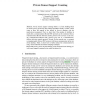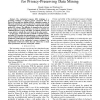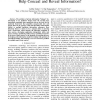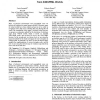1640 search results - page 14 / 328 » Deriving Private Information from Randomized Data |
111
Voted
ICICS
2005
Springer
15 years 7 months ago
2005
Springer
Private itemset support counting (PISC) is a basic building block of various privacy-preserving data mining algorithms. Briefly, in PISC, Client wants to know the support of her i...
215
click to vote
ICDE
2008
IEEE
16 years 3 months ago
2008
IEEE
The randomized response (RR) technique is a promising technique to disguise private categorical data in Privacy-Preserving Data Mining (PPDM). Although a number of RR-based methods...
124
Voted
BMCBI
2010
15 years 1 months ago
2010
Background: Signal transduction events often involve transient, yet specific, interactions between structurally conserved protein domains and polypeptide sequences in target prote...
CORR
2010
Springer
15 years 1 months ago
2010
Springer
Abstract-- The problem of private information "leakage" (inadvertently or by malicious design) from the myriad large centralized searchable data repositories drives the n...
129
click to vote
VRML
2004
ACM
15 years 7 months ago
2004
ACM
Maps of physical environments and geographical areas are pervasively exploited in many human activities. Electronic maps of virtual worlds have been studied and proven to be usefu...




